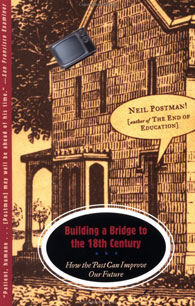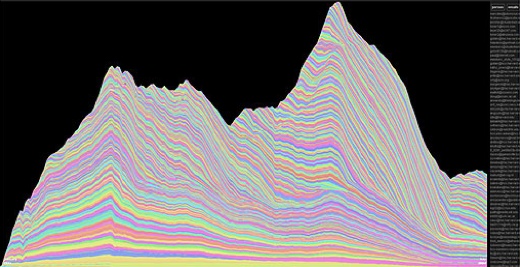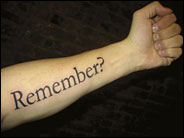lately i’ve been thinking about how the institute for the future of the book should be experimental in form as well as content – an organization whose work, when appropriate, is carried out in real time in a relatively public forum. one of the key themes of our first year has been the way a network adds value to an enterprise, whether that be a thought experiment, an attempt to create a collective memory, a curated archive of best practices, or a blog that gathers and processes the world around it. i sense we are feeling our way to new methods of organizing work and distributing the results, and i want to figure out ways to make that aspect of our effort more transparent, more available to the world. this probably calls for a reevaluation of (or a re-acquaintance with) our idea of what an institute actually is, or should be.
the university-based institute arose in the age of print. scholars gathering together to make headway in a particular area of inquiry wrote papers, edited journals, held symposia and printed books of the proceedings. if books are what humans have used to move big ideas around, institutes arose to focus attention on particular big ideas and to distribute the result of that attention, mostly via print. now, as the medium shifts from printed page to networked screen, the organization and methods of “institutes” will change as well.
how they will change is what we hope to find out, and in some small way, influence. so over the next year or so we’ll be trying out a variety of different approaches to presenting our work, and new ways of facilitating debate and discussion. hopefully, we’ll draw some of you in along the way.
here’s a first try. we’ve decided (see thinking out loud) to initiate a weekly discussion at the institute where we read a book (or article or….) and then have a no-holds discussion about it — hoping to at least begin to understand some of the first order questions about what we are doing and how it fits into our perspectives on society. mostly we’re hoping to get to a place where we are regularly asking these questions in our work (whether designing software, studying the web, holding a symposium, or encouraging new publishing projects), measuring technological developments against a sense of what kind of society we’d like to live in and how a particular technology might help or hinder our getting there.
the first discussion is focused on neil postman’s “Building a Bridge to the 18th Century.” following is the audio we recorded broken into annotated chapters. we would be interested in getting people’s feedback on both form and content. (jump to the discussion)
Category Archives: literature
podcast: discussing neil postman’s “building a bridge to the 18th century”
 (Annotated audio recordings of this discussion appear further down.)
(Annotated audio recordings of this discussion appear further down.)
On the dedication page of “Building a Bridge to the 18th Century,” Neil Postman quotes the poet Randall Jarrell:
Soon we shall know everything the 18th century didn’t know, and nothing it did, and it will be hard to live with us.
Though often failing to provide satisfying answers, Postman asks the kind of first-order questions one hears all too infrequently at a time when technology’s impact on our social, political and intellectual lives grows ever more profound. Postman has been accused of deep reactionism toward technology, and indeed, his hostility toward computers and telecommunications betrays an elitism that discredits some of his larger, and quite compelling observations.
In spite of this, Postman’s diagnosis is persuasive: that the idea of technological progress bequeathed by the Enlightenment has detached from reason and become a runaway train, that we are unquestioningly embracing new technologies that unleash massive change on our family and communal life, our democracy, and our capacity to think critically. We have stopped asking the single most important question that should be applied to all new technological innovations: does this technology solve a problem? If so, then at what cost? To whose benefit? And at whose expense?
Postman portrays the contemporary West as a culture without a narrative, littered with the shards of broken ideologies – depressed, unmotivated, and therefore uncritical of the new technologies that are foisted upon it by a rapacious capitalist system. The culprit, as he sees it, is postmodernism, which he lambasts (rather simplistically) as a corrosive intellectual trend, picking at the corpse of the Enlightenment, and instilling torpor and malaise at all levels of culture through its distrust of language and dogged refusal to accept one truth over another. This kind of thinking, Postman argues, is seductive, but it starves humans of their inspiration and sense of purpose.
To be saved, he goes on, and to build a better future, we would do well to look back to the philosophes of 18th century Europe, who, in the face of surging industrialization, defined a new idea of universal rational humanism – one that allowed for various interpretations within its fold, was rigorously suspicious of religious or any other kind of dogma, and yet gave the world a sense of moral uplift and progress. Postman does not suggest that we copy the 18th century, but rather give it careful study in order to draw inspiration for a new positive narrative, and for a reinvigoration of our critical outlook. This, Postman insists, offers us the best chance of surviving our future.
Postman’s note of alarm, if at times shrill, is nonetheless a refreshing antidote to the techno-optimism that pervades contemporary culture. And his recognition of our “crisis in narrative” – a formulation borrowed from Vaclav Havel – is dead on.
September 19: Bob, Dan, Kim, and Ben discuss Postman’s book at our new Brooklyn office (special prize if you pick out the sound of the ice cream truck passing by).
1. Bob’s preface – thoughts about how we do business at the institute (1:56) (download)
2. Ben’s first impressions – childhood under threat… Dan’s first impressions into discussion – a Clinton-era book, sets up a rather straw man caricature with the postmodernists, but society’s need for a narrative is compelling – why the Christian right has done so well… Postman seems to be assuming that progress is a law, that there is a directed narrative to history – problems with how he treats evolution. (6:43) (download)
3. Bob: Postman is much better at identifying problems than at coming up with solutions. Which is what makes him compelling. His stance is courageous. People assume with technology that just because something can be done it should be done. This is a tremendous problem – an affliction. If you could go back in time and be the inventor of the automobile, would you do it? People get angry at the responsibility this question imputes to them. How can we put these big questions at the center of our work? (13:34) (download)
4. Another big question… “An electronic community is only a simulation of a real community”? Flickr, Friendster, Howard Dean campaign? What is the vehicle for talking about this? What format is best for engaging these questions? Looking for new forms that illuminate or activate the questions. (15:43) (download)
5. Where/who are the public intellectuals today? [The ice cream truck passes by.] Strange bifurcation of the intellectual elite – many of the best-educated people most able to deal with abstraction make their living producing popular media that controls society. (10:07) (download)
6. Is capitalism the problem? Postman’s bias: written language will never be surpassed in its power to deal with abstract thought and cultivation of ideas. But we are arguably past the primacy of print. What is our attitude toward this? (9:39) (download)
7. What opportunities for reflection do different media afford? Films on DVD can be read and reread like a book – the viewer controls, rather than being controlled – a possibility for reflection not available in broadcast. What is the proper venue for discussing this? Capitalism is the 800 lb. gorilla in the room. How do we create, if not a mass agitation, then at least a mass discussion? Tie it to the larger pressing problems of the world and how they will be better addressed by certain forms of discourse and reflection. Averting ecological catastrophe as one possible narrative – an inspiring motivator that will get people moving. How do find our way back into history? (10:09) (download)
8. What should we read next as counterpoint/antidote to Postman? The Matrix – are we headed that way? (12:33) (download)
9. How do we organize new kinds of debates about technology and society? Other issues to be addressed – class, race and gender inequality. (11:26) (download)
marketing books on mobile phones
Harper Collins Australia’s new MobileReader service beams information about new titles and authors, and even book excerpts, to a cellphone. They’re beginning with promotions of Dean Koontz, Paul Coelho and others.
(via textually)
“the minotaur project” featured at ELO
Kim’s hypermedia poem cluster, “The Minotaur Project,” is currently featured at the Electronic Literature Organization. Highly recommended.
“bringing karaoke to literature”

Shanghai Daily reports on a Chinese “mini novel” contest where writers submit bite-sized narratives (350 words or less) by text message.
Commenting on the contest, well-known writer Yu Hua says: “To hold the competition is like bringing ‘karaoke’ to literature. Before the invention of karaoke, there were only few people who could or would sing in public. Thanks to karaoke, anyone and everyone can sing in public whenever they feel like it. Now, thanks to the mobile phone, the same is true with writing.
The karaoke analogy is apt, and a bit scary.
(via textually)
“In the dark woods, on the sodden ground, I found my way only by the white of his collar.”
Someone is blogging Kafka’s diaries, from 1910 to 1923. They’re still in the first year. Either it started recently, or lost steam early at some undetermined date (the editor has opted to remove datelines from posts). Any dates added by Kafka himself are of course retained. Archives are organized by year within the span of the diaries.
I subscribed to the feed to see if it keeps updating (they’re using a recent version of Movable Type – more recent than ours – so I bet things are active). It could be a nice way to read these.
There’s also a blog of the diary of Samuel Pepys, which seems to have been chugging along for about two years. A nice touch is that instead of comments they have “annotations.” A quick glance reveals that quite a number of people are participating in this reading.
update: Another good book blogging experiment worth checking out is Bryan Alexander‘s Dracula Blogged – “Bram Stoker’s vampire novel, published by its own calendar” – which will conclude sometime in November. A particularly clever choice, since Dracula is largely written in letters and journal entries.
the selected, annotated outbox of dave eggers
Email killed the practice of letter-writing so suddenly that we haven’t a chance to think about the consequences. The Times Book Review ran an essay this weekend on the problem this poses for literary historians, biographers and archivists, who long have relied on collected letters and papers to fill in the gaps between a writer’s published work. In the same review, the Times covers a new biography of the legendary critic Edmund Wilson largely based on his correspondences, and last week covered a new collection of the letters of poet James Wright. Letters are often treated as literature in themselves.
 But a crop of writers is working now whose papers are not in order. The email is rotting away on the network, unorganized, not backed-up, and, to a great extent, simply being lost for good. I actually mused about this in a post last month about an email archive visualization tool by Fernanda Viégas at M.I.T.’s Sociable Media Group that shows years of electronic correspondence as sedimentary levels in a mountain-like mass. And a mountain it is. One novelist I know in Washington has her office stacked high with milk crates containing printouts of each and every email she sends and receives, no matter how trivial. There has to be a better way.
But a crop of writers is working now whose papers are not in order. The email is rotting away on the network, unorganized, not backed-up, and, to a great extent, simply being lost for good. I actually mused about this in a post last month about an email archive visualization tool by Fernanda Viégas at M.I.T.’s Sociable Media Group that shows years of electronic correspondence as sedimentary levels in a mountain-like mass. And a mountain it is. One novelist I know in Washington has her office stacked high with milk crates containing printouts of each and every email she sends and receives, no matter how trivial. There has to be a better way.
There isn’t necessarily anything less rich about email correspondence. It excels at capturing a vibrant volley of words with great immediacy, whereas paper letters permit deeper communiques, fewer and father between. But in some cases, these characterizations do not hold up. With reliable postal service, letters can fly back and forth quite rapidly. And just because an email suddenly appears in your box does not mean that it will be immediately read, let alone replied to. Sometimes we write long email letters, expecting that the receiver is busy and will take time to reply. These differences, true and false, are worth evaluating.
But if collected emails are to become a literary tool, there is no question that we will need more reliable ways of archiving and preserving digital correspondence. We will also need new editorial approaches for collecting and publishing them. A printed volume, or series of volumes, might be insufficient for presenting a massive 4 gigabyte email archive by Dave Eggers (No one wants to read the phone book from cover to cover). And according to the Times piece, Eggers’ agent Andrew Wylie is mulling over such a project. What would make more sense is an electronic edition that is essentially a selected or complete annotated Eggers Outbox, with folders and tags provided for categorization, a powerful search function, and the ability to organize according to your own interests. There would also be browsing and skimming tools that would allow a reader to move rapidly across vast tracts of correspondence and still find what they are looking for. And maybe, a way to email the author yourself and become a part of the living archive.
Intertextual Community
 When I read about Shelly Jackson’s new project–to “publish” a story by tattooing each of its 2,095 words onto the body of a different person–I thought what a great idea, and I wondered if it might actually be telling us something about the direction books are going. As the digital book begins to emerge–glorious, ephemeral, and electric–are we going to feel compelled to make something even more intimate and rarified as counterpoint?
When I read about Shelly Jackson’s new project–to “publish” a story by tattooing each of its 2,095 words onto the body of a different person–I thought what a great idea, and I wondered if it might actually be telling us something about the direction books are going. As the digital book begins to emerge–glorious, ephemeral, and electric–are we going to feel compelled to make something even more intimate and rarified as counterpoint?
“Skin Literature”
Three Books That Influenced Your Worldview: The List
Yesterday I was thinking about the fact that books were the crucial element in the formation of my world view and wondered if that is the case with younger people. My guess yesterday morning was that people over 40 would easily come up with a list of books that influenced their way of looking at the world. Also – and this was probably the key idea I was testing – I assumed that when baby boomers came of age, specifc books (let’s say a dozen titles) were a crucial element in a shared cultural zeitgeist. By contrast, today I don’t see particular titles dominating the scene as they did 35 years ago.
Well . . . turns out I was pretty much wrong, at least as far as the 100+ people in my 40+ and 35- sample groups were concerned. Very few titles made it on to more than one list and I don’t see dramatic differences in the lists based on age.
One remarkable fact which you’ll notice when you look at the lists is the fantastic diversity in print culture. One can only dream that we will one day have such rich variety among works which are born digital.
This experiment of course hints at the bigger question: are books as important today in terms of forming world view as they were 35-40 years ago, and if not, what is taking their place? Most importantly: if not, what effect does the shift in dominant media have on the creation of world view?
If this gets anyone’s juices flowing, we’d love to have suggestions about how to explore these questions further.
Continue reading for the list…
